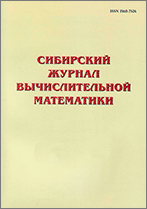|
This article is cited in 13 scientific papers (total in 13 papers)
Sequential data assimilation algorithms in air quality monitoring models based on weak-constraint variational principle
A. V. Penenko, V. V. Penenko, E. A. Tsvetova
Institute of Computational Mathematics and Mathematical Geophysics SB RAS, 6 Lavrentiev pr., Novosibirsk, 630090, Russia
Abstract:
Data assimilation problem for non-stationary model is considered as a sequence of the linked inverse problems which reconstruct, taking into account the different sets of measurement data, the space-time structure of the state functions. Data assimilation is carried out together with the identification of additional unknown function, which we interpret as a function of model uncertainty. The variational principle serves as a basis for constructing algorithms. Different versions of the algorithms are presented and analyzed. Based on the discrepancy principle, a computationally efficient algorithm for data assimilation in a locally one-dimensional case is constructed. The theoretical estimation of its performance is obtained. This algorithm is one of the core components of the data assimilation system in the frames of splitting scheme for the non-stationary three-dimensional transport and transformation models of atmospheric chemistry.
Key words:
data assimilation, variational principle, weak-constraint, direct and inverse problems, model as regularizer, sequential algorithms.
Received: 04.12.2015
Revised: 30.05.2016
Citation:
A. V. Penenko, V. V. Penenko, E. A. Tsvetova, “Sequential data assimilation algorithms in air quality monitoring models based on weak-constraint variational principle”, Sib. Zh. Vychisl. Mat., 19:4 (2016), 401–418; Num. Anal. Appl., 9:4 (2016), 312–325
Linking options:
https://www.mathnet.ru/eng/sjvm626 https://www.mathnet.ru/eng/sjvm/v19/i4/p401
|

| Statistics & downloads: |
| Abstract page: | 266 | | Full-text PDF : | 84 | | References: | 47 | | First page: | 12 |
|




 Contact us:
Contact us: Terms of Use
Terms of Use
 Registration to the website
Registration to the website Logotypes
Logotypes









 Citation in format
Citation in format 
